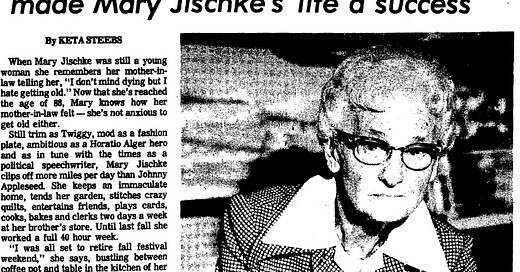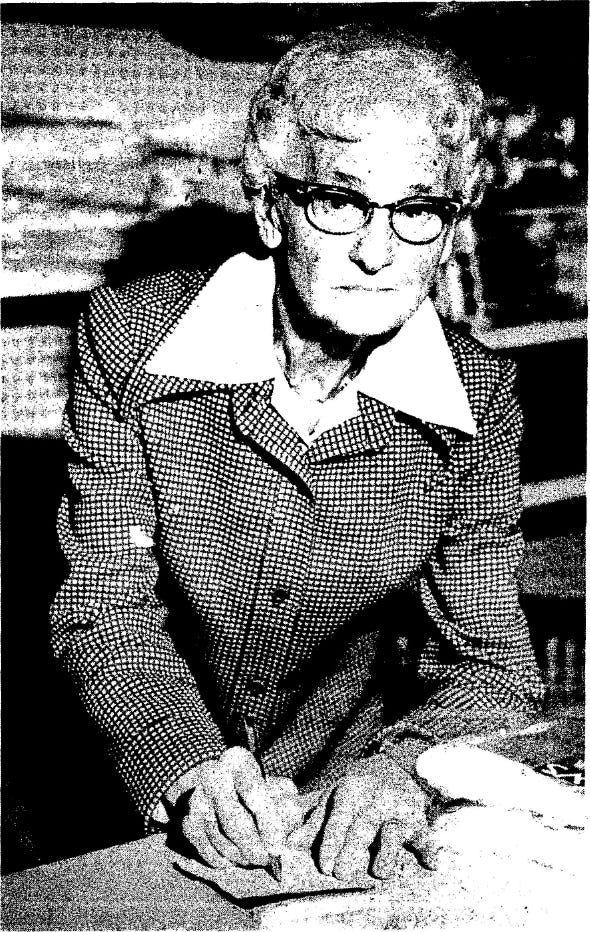"Resourcefulness and hard work made Mary Jischke's life a success" from the May 13, 1976 Door County Advocate
By KETA STEEBS
Mary Jischke on duty 88 years old Tuesday —Hagedorn
Resourcefulness and hard work made Mary Jischke's life a success
By KETA STEEBS
When Mary Jischke was still a young woman she remembers her mother-in-law telling her, "I don't mind dying but I hate getting old." Now that she's reached the age of 88, Mary knows how her mother-in-law felt — she's not anxious to get old either.
Still trim as Twiggy, mod as a fashion plate, ambitious as a Horatio Alger hero and as in tune with the times as a political speechwriter, Mary Jischke clips off more miles per day than Johnny Appleseed. She keeps an immaculate home, tends her garden, stitches crazy quilts, entertains friends, plays cards, cooks, bakes and clerks two days a week at her brother's store. Until last fall she worked a full 40 hour week.
"I was all set to retire fall festival weekend," she says, bustling between coffee pot and table in the kitchen of her gleaming home located just beyond the Sister Bay boundary line. "Brother Bill talked me into coming in two days a week."
Brother Bill is Bill Bunda, owner of Bunda's Store in Sister Bay. The Bunda store has been a Sister Bay landmark since 1892 but its antecedent goes back even farther in time, back to the days when Wenzel Bunda, Mary and Bill's father, operated a small but successful dry goods business in the basement of the Andrew Roeser home.
Realizing the need for a much larger establishment, Roeser, a man of substance blessed with foresight, built Bunda a bona fide store of his own on the site of the present building. The original store was reduced to rubble in the great fire of 1912 and its replacement met a similar fate in 1941 but the present Bunda Department Store rose like Phoenix from the ashes a few years later to again carry on the family tradition.
The new store, like its predecessors, has played an important role in the life of Mary Bunda Jischke. She remembers clerking at the age of 11 alongside sister Annie (barely 13) when both girls were just about "knee high to the notions counter."
By then the Bunda store's future rested squarely on the shoulders of the newly widowed Mary Worachek Bunda. Wenzel died at the age of 32 leaving his young wife with four small children, a demanding business, financial obligations and very little male help. Bill was a baby, Annie had just entered her teens and Leona, the youngest daughter, was too small to be of assistance in the store but she could, and did, look after things at home.
"Mother taught her girls to be independent and to use their God-given brains and ability to good advantage," Mary recalls. "We learned at an early age that there was very little we couldn't do once we had the courage to tackle it."
Tackle it they did. While their mother supplemented her unpredictable store income by making hats and taking in boarders the three Bunda girls learned to keep books, wait on trade, deal with drummers ( traveling salesmen) and still keep abreast of their schoolwork, housework and social life.
"Make no mistake about it," Mary says firmly. "We still found time for fun. Mother always let us go home early on Saturday nights to get ready for a dance. Square dances were popular in those days and until some visiting Milwaukeeans showed us the waltz it was the only dance we knew."
Dances were held at Fleck's Hall (now the Sister Bay Bowl) and although Mary doesn't say so her subsequent romance with a young cherry grower named Martin Jischke probably began (or matured) at Pleck's. At any rate Pleck's was the hub of Sister Bay's social life for several decades and it was here that Mary and Martin Jischke received their wedding guests on the night of Sept. 14, 1911.
"We danced until three in the morning," Mary smiles. "I can remember getting home dead tired only to hear mother knocking on the door a few hours later asking me to get the mail out because she wasn't feeling well."
It seems that the village postal service had also been assumed by the resourceful Mrs. Bunda and "getting the mail out" was an obligation not to be taken lightly. Mary says that even though it left her hands on time the mail's actual exodus from the village was often uncertain. Because of Pleck's handy location stagecoach drivers found it exceedingly convenient to quench their thirst (undoubtedly incurred from dusty roads) at the hospitable corner bar.
"Drivers usually got to our place in good shape," Mary smiled, "but by the time they set off for Ellison Bay some of them had to be pointed in the right direction."
After duly taking care of the mail that Wednesday morning following her wedding Mary carefully hung her braided alpaca bridal gown (handmade by Edith Becker) and set off with Martin for the Door county fair. A trip to Sturgeon Bay was the traditional honeymoon for northern Door newlyweds in that horse and buggy era and Mary vividly recalls the day's "doings" with affection. They had, she says, a wonderful time.
Mary and Martin Jischke observed their 50th wedding anniversary in St. Rosalia church, the scene of their original vows, on Sept. 14, 1961 shortly before Martin's health began to fail. Widowed in 1964, Mary looks back on years spent working as her husband's postal assistant (he served as postmaster through two different political administrations) and many more years helping out in the Jischke Meat Market. During her half century of married life Mary bore five children, picked and graded cherries in the family orchard, served as the Sister Bay Woman's club's first president, joined the St. Rosalia Altar Society, became active in church affairs and about a quarter century ago went back to her old job in the family store.
"I clerked full time for the past 27 years," she says. "Now I'm glad I'm down to two days a week. Imagine being through at five o'clock and not having to start until nine. In the old days we opened at eight and worked until nine six days a week."
Although she and Martin worked as a team during their 53 years together Mary says her husband was both "boss" of the business and "man of the house."
"I wouldn't have wanted it any other way," she says thoughtfully.
Mary's memories of her happy relationship with her husband and continuing close ties with her children, grandchildren and great-grandchildren "keep her going." A survivor of seven major operations, Mary enjoys good health, has few aches or pains and with the help of daily vitamins and a sensible diet has managed to ward off that tired people feeling so common to people over 50.
Unlike most persons born in the Victorian age Mary doesn't think the world is in bad shape today nor does she believe kids are any different now than they've ever been. "Those who come from happy homes usually have a good life; those whose parents don't like each other usually don't like the world," she states succinctly.
Over-simplification, maybe, but that's the way Mary sees it. The active octogenarian also candidly admits there is no better way of getting to know a person than to do business with him. Despite infrequent encounters with a few less than pleasant customers and salesmen, however, Mary still finds meeting people a rewarding experience.
"Maybe you think I've stuck my nose to the grindstone too much," she grins. "But work has been my life. Work, my family and my very good friends."
Mary's family consists of Joe and Alice, both in California, Francis (Frank) and Janet in Chicago and George, her next door neighbor on the family farm. She has 17 grandchildren and 17 great-grandchildren and all of them, she says happily, love coming back home.
You'll find Mary each Wednesday and Saturday in "domestics" (her familiar department) or fitting shoes, measuring material, wrapping gifts or selling cosmetics.
"I fill in wherever I'm needed," she confides. And that, in a nutshell, is Mary Jischke's recipe for a long, happy life.
Courtesy of the Door County Library Newspaper Archive
Articles by Keta Steebs:
https://doorcounty.substack.com/t/keta-steebs
Articles related to the Postal Service:



